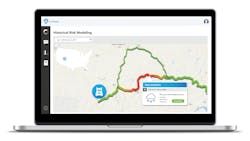Baron introduces Weather API for fleets
Baron has introduced its Baron Weather API for Fleet, a range of weather data that can be integrated into network fleet platforms. According to the company, the Baron Weather API was developed for fleet management tracking platforms, transportation management systems for pre-planning, and mobile driver applications.
“Baron Weather API helps ensure operational and asset safety and improves operational efficiency,” the company noted. “The availability of highly accurate and granular predictive weather information helps fleet companies reduce weather-related accidents. It is essential for reducing the costs of freight industry weather-related delays. By providing cutting edge weather information, the advanced technology contained in Baron Weather API for Fleet also helps the trucking industry with driver retention.”
Fleets can plan routes ahead of time to avoid inclement weather, and get better situational awareness around storms. The company added that patented technologies include real-time and forecast road conditions that identify dangerous roads before the delays begin; current road conditions weather to help track conditions experienced by fleet vehicles in real time; and Baron Storm Tracking, which provides storm arrival and location details.
Other available data features include forecast precipitation, winds, snowfall, and temperatures. This information is tracked over the next 60 hour period to show the potential impact on fleet operations, helping fleets plan before disruptions begin, the company added.

